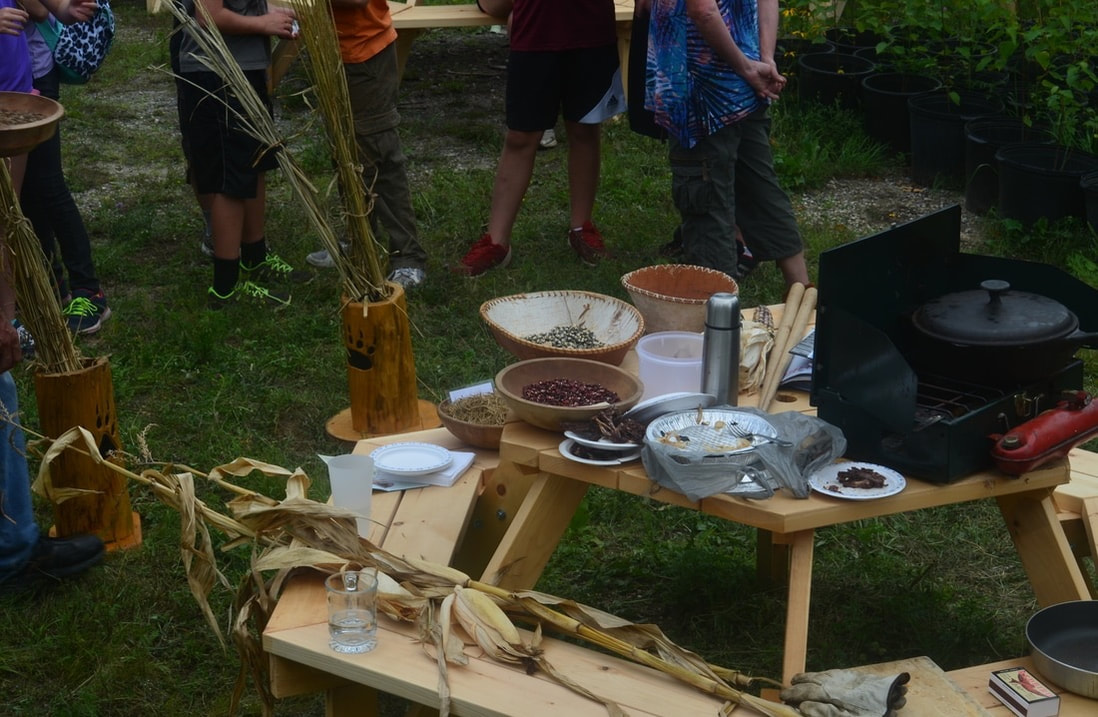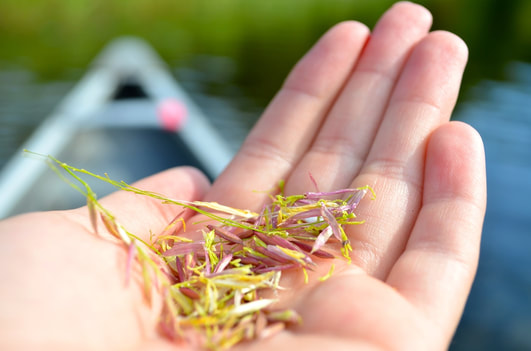Indigenous Food Sovereignty
Since time immemorial Indigenous Peoples have lived and thrived on the lands and waters of Turtle Island (North America). Indigenous food systems involve a combination of sophisticated agricultural and food production sites, strong trading relationships between Nations, and local harvesting from the lands and waters. It is only in recent centuries that Indigenous Peoples have struggled to practice food sovereignty as these traditional land-based food systems have been forcibly eroded by the impacts of colonization. Some examples of these impacts include the forcing of Indigenous people onto reserves, banning hunting practices and other food gathering practices such as wild ricing, banning other cultural celebrations and ceremonies associated with important food practices, as well as direct threats to Indigenous food sources by deliberate Canadian government policies put in place to exterminate Indigenous Peoples (for example, the slaughtering of the bison on the Canadian prairies, which ended a way of life where bison were part of a traditional and cultural system, and shifted the balance of power between First Nations and the Canadian state), policies that favour sport hunting and penalize Indigenous Peoples for hunting in their traditional manner, other hunting practices leading to overhunting, landscape changes and disruptions such as forestry and hydropower, and industry-related contamination of the environment. One notable example is the near disappearance of the American eel from Anishnaabeg and Haudenosaunee territories, due mainly to the widespread use of dams and hydro-electric turbines in the region (see our “Species at Risk” page for more info). Indigenous food sovereignty asserts the cultural importance of eating foods that are not only nutritious but an essential part of cultural frameworks (that include spiritual and empathic relationships). Reflecting the importance of food sovereignty to Indigenous Nations, it was usually a main component in treaties negotiated with the crown. A key component of this is reconnecting with aquatic land-based food practices. The fundamental right of Indigenous people to food sovereignty is reflected in the United Nations Declaration on the Rights of Indigenous Peoples (UNDRIP), specifically Articles 20, 24, 25, 26, 29.
Some important wild foods for Algonquin and other Indigenous communities in this region include wild rice (manoomin, kontatewenní:io oná:tsia), white-tailed deer (wàwàshkeshì, ohskenón:ton), moose (moz, ska’niónhsa), American eel (pimizì, ohstonhnéha kiawerón:ko), wild ginger (odjìbiki-tibweban, tsionehskwén:rie), wild garlic (wàbi-shigàgowinj, watatewenní:io iokháhon), mushrooms (wazhashkwedoons, otskwà:rhe raókhwa), ruffed grouse (pàpàshke, ohkwé:sen), ducks (shìshìb, só:ra), geese (nika, káhon’k), wild turkey (misise, skawiró:wane), maple sap/syrup (onzibàn(sap)/shìwàgamizigan(syrup), wah:ta oh:ses), and many types of berries including strawberry (odeyimin, ken' niiohontésha), raspberry (miskomin, skanekwen’tará:nen), gooseberry (shàbòmin, tewénnnia’ke aonáhi), blackberry (aditagàgomin, shá:ise), and many others.
Some important wild foods for Algonquin and other Indigenous communities in this region include wild rice (manoomin, kontatewenní:io oná:tsia), white-tailed deer (wàwàshkeshì, ohskenón:ton), moose (moz, ska’niónhsa), American eel (pimizì, ohstonhnéha kiawerón:ko), wild ginger (odjìbiki-tibweban, tsionehskwén:rie), wild garlic (wàbi-shigàgowinj, watatewenní:io iokháhon), mushrooms (wazhashkwedoons, otskwà:rhe raókhwa), ruffed grouse (pàpàshke, ohkwé:sen), ducks (shìshìb, só:ra), geese (nika, káhon’k), wild turkey (misise, skawiró:wane), maple sap/syrup (onzibàn(sap)/shìwàgamizigan(syrup), wah:ta oh:ses), and many types of berries including strawberry (odeyimin, ken' niiohontésha), raspberry (miskomin, skanekwen’tará:nen), gooseberry (shàbòmin, tewénnnia’ke aonáhi), blackberry (aditagàgomin, shá:ise), and many others.
“Food sovereignty is an affirmation of who we are as Indigenous peoples, and a way, one of the most sure-footed ways, to restore our relationship with the world around us.”
-Winona LaDuke, Gichi-ziibiwininiwag (Mississippi Chippewa)
“The land is our identity and holds for us all the answers we need to be a healthy, vibrant, and thriving community. In our oral traditions, our creation story, we are taught that the land that provides the foods and medicines we need are a part of who we are. . . . This is our medicine; remembering who we are and the lands that we come from."
- Valerie Segrest, bəqəlšuł (Muckleshoot)


